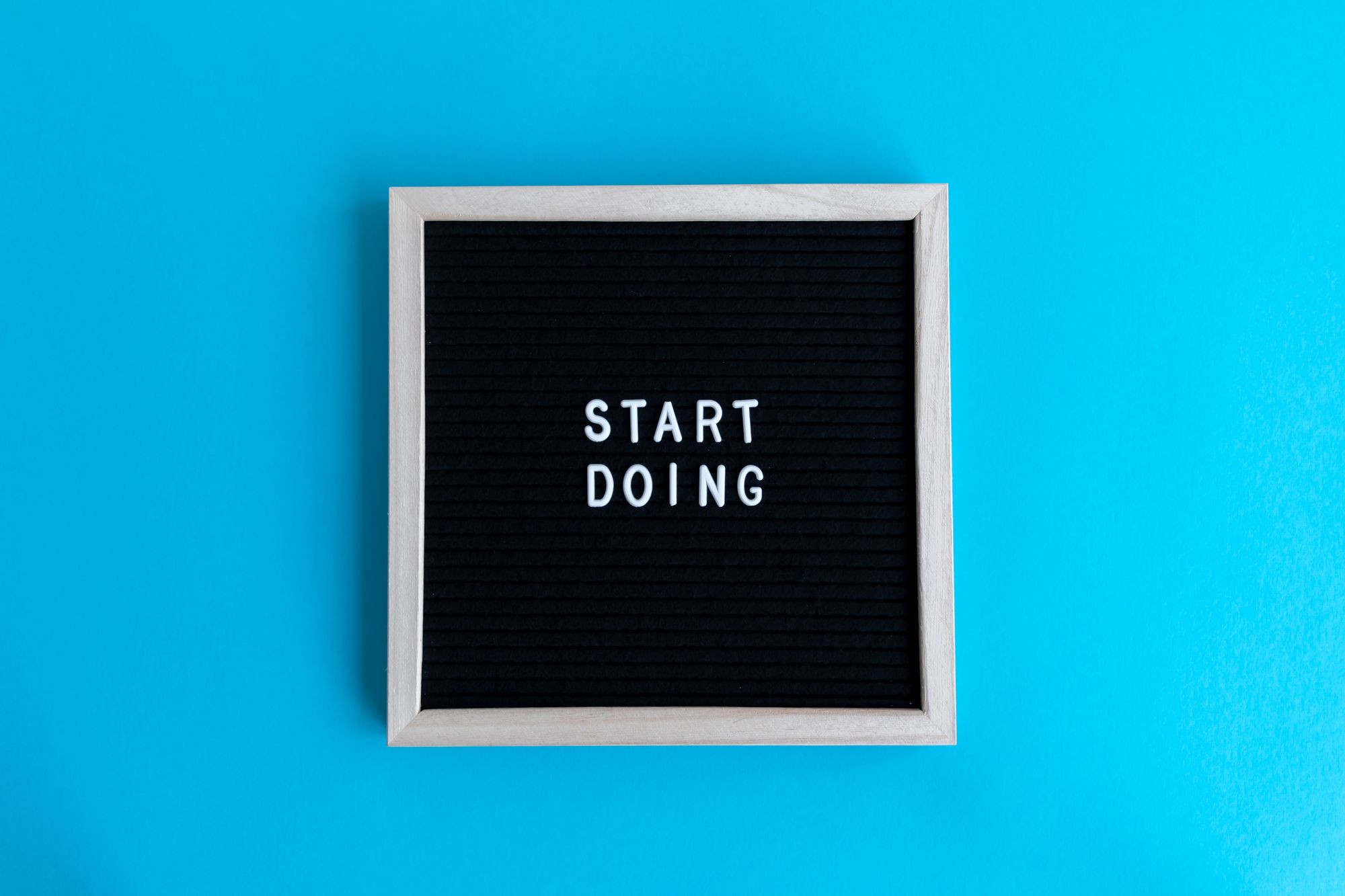Why Overplanning Is a Trap And How to Stop
I love a good plan but it can easily become a crutch that prevents you from just doing. Learn 5 strategies to stop overplanning and get started!

I love to plan.
I find making spreadsheets and lists soothing. I like doing research and reading about various scenarios or options. I like imagining what will happen and thinking about potential outcomes.
But sometimes I find myself avoiding taking the next step to actually book/commit/start whatever it is I am planning. I circle back to the plan and plan a little more. I want to make it perfect, to know a little more and have more details figured out…but then weeks go by and no real progress has been made.
I, sometimes, over-plan 😬.
What is overplanning?
Overplanning happens when you spend a lot of time researching, talking about, and thinking about what you are going to do…but never quite doing the thing.
It’s wanting to know the exact steps you will take and to have all the relevant information you might need so you can be sure you take the correct path and not waste any time.
While this intention seems reasonable, it can become a trap and waste more time than if you had just started.
Why overplanning is a trap
Overplanning is a symptom of perfectionism. It’s the desire to control outcomes, despite the fact that nothing will ever be perfect, and we have very little control over most outcomes.
Overplanning makes you feel like you’re making progress, but it allows you to avoid the uncertainty, risk, and fear of actually starting.
Overplanning is a trap because:
- Overplanning allows you to hide
When you don’t actually start (or finish) something, you don’t have to feel vulnerable or worry about failing. - Overplanning makes you inflexible
Even if you do start, it’s much harder to adapt when things don’t go exactly to plan (which they almost never do). - Overplanning leads to overthinking
As you consider every possible consequence or outcome, it is easy to have decision paralysis and flip-flop between options, never committing.
Don’t get me wrong, making a plan and setting goals is incredibly important. As I said, I love a good plan. But it can easily become a crutch that prevents you from just doing.
How do you know you are overplanning?
Here are some signs that you are overplanning:
- You take a long time to start projects because you want to feel completely prepared.
- You have a lot of unstarted or abandoned projects.
- You feel like you get bogged down in the details.
- You have a hard time adjusting when things go sideways.
Sound familiar? Don’t worry! You’re not alone.
It’s normal to want to feel in control and want to prevent future problems, but the truth is, there is only so much you can plan for. Often you don’t know what you don’t know and all the work you do over-planning will be for naught because there will always be things you didn’t take into account.
How to stop overplanning and get started
Instead of trying to anticipate every possible outcome, it is much more efficient to set a loose guide and then just start the work! You can iterate and shift paths as you go.
Starting is scary, but once you do, everything gets easier.
Here are 5 strategies to help you stop overplanning and get started!
1. Set a time limit to create an outline or basic plan…and no more
There is, of course, a ton of value in doing basic planning and being intentional about how you spend your time. The danger is when it stops you from ever moving forward. Instead of obsessing about having the perfect plan:
- Set aside a specific amount of time for planning
- Create an outline of known steps or ideas
- Pick a start time and date
- Start!
The amount of time you spend will depend on the size and scale of your project, but keep it short. The most important step is starting!

2. Create a specific rhythm for planning
Create a regular planning habit that allows you to be intentional with your time without overplanning. Maybe on Monday mornings, you set aside half an hour to map out your week as best you can. Maybe the last thing you do for the last 15 minutes of the day is set your intended to-do list for the following day.
The idea is to have a specific rhythm for when you are doing planning activities (versus doing activities), so you don’t veer into overplanning and spend a ton of time planning what you want to do, instead of doing it!
For example, I time-block my to-dos for different projects each upcoming week on Sunday evenings. I usually take half an hour and, while it’s never perfect, it sets my expectations for what I can most likely achieve in the week, given my current schedule and commitments.
3. Set deadlines for your projects or goals (and tell someone!)
Nothing motivates like a deadline…and being held accountable to that deadline! Think about a reasonable timeline for whatever you are working on and set a deadline for when you think you can achieve it. Then tell someone!
This is especially important for personal projects. Those are the ones that most often end up hanging over you, never quite complete. Tell your best friend or partner about what you want to do. Tell them what you are going to do it. Ask them to ask you about it!
If it’s business-related, look into joining a peer accountability group or create one of your own. There are business groups out there that meet regularly to give updates on their business goals and projects to help keep each other accountable.
Otherwise, ask a few colleagues or friends to create an accountability group with you. Set a weekly or bi-weekly Zoom chat where you share your goals and progress on a regular basis. You don’t have to be in the same business or industry, just other professionals who could use that extra nudge forward like you.
4. Identify “the next right thing” for each project. What is the first actionable step?
Looking forward at an entire project or goal can feel overwhelming. But you don’t need to know every step you are going to take or what the exact end result will be. You only need to know the next step, which will give you information to help you figure out the next one, and then the next one, and so on.
Don’t worry about all the parts of the project that come later. Pick the smallest actionable step you can do, and do it. The next right thing will become more clear as you go.

5. Let go of perfect and embrace good enough.
To all of you (recovering) perfectionists out there (raises hand👋), remember that perfect is the enemy of good, but even worse, it’s the enemy of done. There is no such thing as the perfect anything and trying to make something so is an exercise in futility.
Try to shift how you think about whatever you are working on from being perfect to good enough. And when I say good enough I mean does it meet the parameters of what you were trying to do in the first place?
Bring it back to your why: Why are you doing it in the first place? What is the outcome you want to achieve?
Beyond being good enough, something else to consider is that it’s much easier to be better at something than to be good at something. Thinking about your project or goal in those terms takes some of the pressure off because you can focus on incremental improvements versus trying to be an expert.
A little planning goes a long way…emphasis on the little. While it can be hard to let go of the desire to be prepared for every possible outcome or event, the truth is, you can’t be. You don’t have enough information because you haven’t gone far enough down the path.
Once you start, you collect the information you need to make the next right decision. And the next, and the next, and so on. It won’t be perfect, but it will be good. You just have to start!
Do you find yourself overplanning versus starting something? I can help kickstart your progress and keep you accountable. Let's chat!
Share
Ashley Janssen

Productivity consultant, writer, speaker, serial entrepreneur, chaos calmer, introvert, cat-lady. Lover of books, fitness, old fashioned’s, basketball, and video games.
Follow me on
Twitter
or
LinkedIn.
Hire me for
1 on 1 productivity consulting
or
speaking.
Related articles

Why Are You Productive For "Only" 5-6 Hours Each Day?

When You Do Things Matters


Comments ()